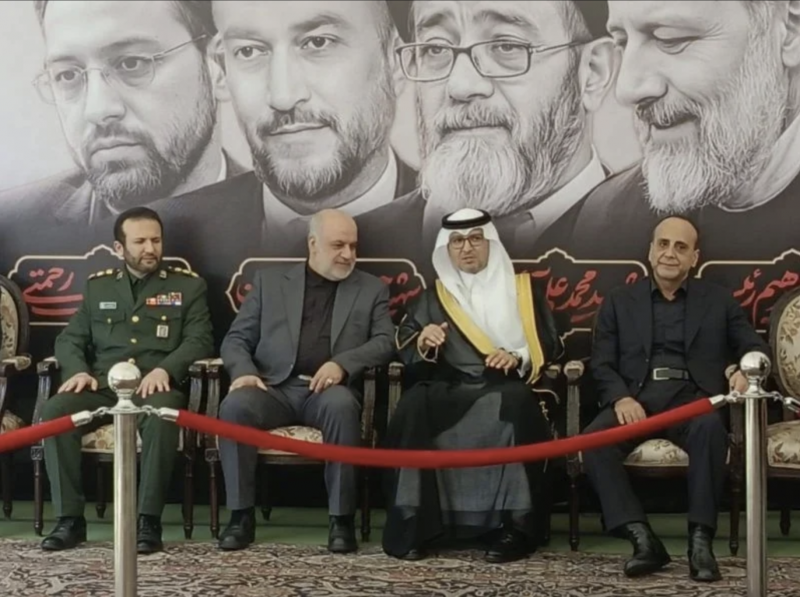
Saudi ambassador to Lebanon Walid Boukhari (second from right) stands with Ammar Moussaoui, Hezbollah's head of Arab and foreign relations, as they present their condolences to the Iranian ambassador on May 22, 2024, in the southern suburbs of Beirut. (Credit: X)
On Wednesday, the Iranian embassy in Beirut opened its doors to political and media figures wishing to offer their condolences for the deaths of President Ebrahim Raisi and his Foreign Minister Hussein Amirabdollahian in a helicopter crash on Sunday.
One of the figures who visited on Thursday was the Saudi ambassador to Beirut Waleed Bukhari. This move is not surprising, as the Iranians and Saudis have resumed contact following their reconciliation agreement in March 2023. Since then, Bukhari and his Iranian counterpart Mojtaba Amani have met several times.
The Saudi diplomat spoke with Ammar Moussawi, Hezbollah’s head of Arab and international relations, at the Iranian embassy. This was the first public encounter between a Saudi diplomat and an official of the Iran-aligned party in years.
Two photos of this one-to-one circulated on the internet on Thursday. The first shows them seated next to each other uncomfortably. The second shows them smiling and chatting. The ice seems to have been broken.
However, L’Orient-Le Jour learned that the one-to-one didn’t last long, and no thorny issues were raised. There was no mention of the presidential elections, in which Hezbollah hopes for a Saudi green light for its candidate, Marada movement Leader Sleiman Frangieh, or the strained relations between Hezbollah and Riyadh. The latter has considered the group a terrorist organization since 2016 and accuses it of being involved in Captagon trafficking into its territory.
Nevertheless, both parties are aware of this brief encounter’s symbolic meaning. “Moussawi and Bukhari found themselves next to each other and had a cordial discussion,” said a source close to Hezbollah.
“However, it has to be said that this is an indicator of openness on both sides, which can naturally lead to more in the future, especially as this is the first encounter of this kind in a very long time,” the source said.
‘This photo is going to hurt a lot of people’
In Hezbollah’s circles, it is said that this encounter is part of the rapprochement between Riyadh and Tehran, at a time when tensions between Sunnis and Shiites in the region seem to be at an all-time low, particularly after the outbreak of war in Gaza on Oct. 7, 2023.
On May 13, the Saudi ambassador to Iraq, Abdulaziz Al-Shammari, visited Karbala, a major Shiite pilgrimage site. There, he expressed his admiration for this “holy city” and promised Saudi investment in the country, which is nevertheless perceived under Iran’s zone of influence.
In Lebanon, political actors, notably Hezbollah, hope that Arab donors will participate in the economic recovery once the war between Israel and Hamas/Hezbollah ends, notably in the reconstruction of southern Lebanon. According to preliminary estimates, the damage to the south is roughly $2 million, excluding the loss in revenues and the impact of the war on agricultural land.
Riyadh has long been one of the main financiers of Lebanon’s Treasury. Yet, it gradually withdrew from the country in 2016, arguing that the influence of Iran and Hezbollah is too big in the country.
The encounter did not go unnoticed on social media. “You don’t see this every day,” wrote Israeli journalist Roi Kais. In Saudi Arabia, after years of campaigning against Hezbollah, some people had trouble swallowing the pill.
“How can he sit with a terrorist?” asked a Saudi internet user critical of the government. On the Iranian axis, however, there seemed to be some satisfaction. A post by an internet user aligned with Hezbollah wrote, “This photo is going to hurt a lot of people.”
This article was originally published in L'Orient-Le Jour. Translated by Joelle El Khoury.